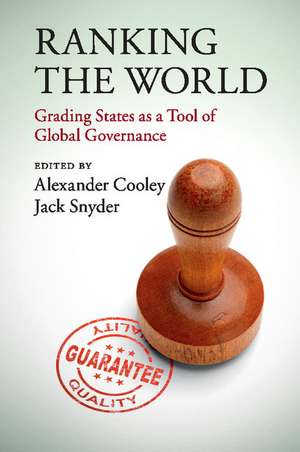Ranking the World: Grading States as a Tool of Global Governance
Editat de Alexander Cooley, Jack Snyderen Limba Engleză Paperback – 19 oct 2016
| Toate formatele și edițiile | Preț | Express |
|---|---|---|
| Paperback (1) | 283.25 lei 6-8 săpt. | |
| Cambridge University Press – 19 oct 2016 | 283.25 lei 6-8 săpt. | |
| Hardback (1) | 713.66 lei 6-8 săpt. | |
| Cambridge University Press – 29 apr 2015 | 713.66 lei 6-8 săpt. |
Preț: 283.25 lei
Nou
Puncte Express: 425
Preț estimativ în valută:
54.21€ • 56.44$ • 45.81£
54.21€ • 56.44$ • 45.81£
Carte tipărită la comandă
Livrare economică 07-21 martie
Preluare comenzi: 021 569.72.76
Specificații
ISBN-13: 9781107484122
ISBN-10: 110748412X
Pagini: 256
Ilustrații: 36 b/w illus. 7 tables
Dimensiuni: 151 x 228 x 14 mm
Greutate: 0.35 kg
Editura: Cambridge University Press
Colecția Cambridge University Press
Locul publicării:New York, United States
ISBN-10: 110748412X
Pagini: 256
Ilustrații: 36 b/w illus. 7 tables
Dimensiuni: 151 x 228 x 14 mm
Greutate: 0.35 kg
Editura: Cambridge University Press
Colecția Cambridge University Press
Locul publicării:New York, United States
Cuprins
1. The emerging politics of international rankings and ratings: a framework for analysis Alexander Cooley; 2. Just who put you in charge? We did: CRAs and the politics of ratings Rawi Abdelal and Mark Blyth; 3. Corruption rankings: constructing and contesting the global anti-corruption agenda Mlada Bukovansky; 4. Measuring stateness, ranking political orders: indices of state fragility and state failure Nehal Bhuta; 5. Lost in the gray zone: competing measures of democracy in the former Soviet republics Seva Gunitsky; 6. Winning the rankings game: the Republic of Georgia, USAID, and the Doing Business Project Sam Schueth; 7. Conclusion. Rating the ratings craze: from consumer choice to public policy outcomes Jack Snyder and Alexander Cooley.
Recenzii
'Ranking the World is a truly unique contribution - the 'top ranked' book of its kind since I cannot think of another quite like it. It is a must read for anyone interested in the increasingly important politics of rankings in international relations.' Peter Andreas, John Hay Professor of Political Science and International Studies, Brown University, Rhode Island
'Since the 1970s, ratings and rankings have become an ever-present feature of life in most developed and transitional societies. These ubiquitous measures reflect the 'powerful allure of the technocratic model of policy evaluation and performance accountability', write the editors of this outstanding collection of chapters unearthing the dark underbelly of ratings politics. Covering democracy, state failure, corruption, press freedom and investment, the various authors argue forcefully that, despite their methodological flaws, systematic biases and susceptibility to manipulation, ratings and rankings now cause political and economic change as much as reflect it. The use of simplistic numerical grades as substitutes for informed debate about policy priorities and effectiveness, outlined in this highly original and important book, should concern us all.' Stephen Hopgood, School of Oriental and African Studies, University of London
'Since the 1970s, ratings and rankings have become an ever-present feature of life in most developed and transitional societies. These ubiquitous measures reflect the 'powerful allure of the technocratic model of policy evaluation and performance accountability', write the editors of this outstanding collection of chapters unearthing the dark underbelly of ratings politics. Covering democracy, state failure, corruption, press freedom and investment, the various authors argue forcefully that, despite their methodological flaws, systematic biases and susceptibility to manipulation, ratings and rankings now cause political and economic change as much as reflect it. The use of simplistic numerical grades as substitutes for informed debate about policy priorities and effectiveness, outlined in this highly original and important book, should concern us all.' Stephen Hopgood, School of Oriental and African Studies, University of London
Descriere
This book examines the origins of the rise of international rankings, assessing their impact on global governance, and exploring how governments react to being ranked.















